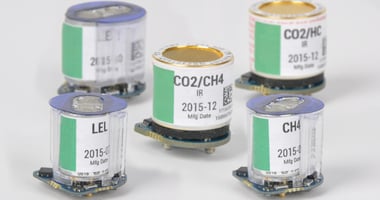 The Tango TX line of gas monitors is adding two new sensors to its portfolio – hydrogen cyanide (HCN) and ammonia (NH3). Previously, these sensor options were only available with the single-gas monitor Gasbadge Pro and with the multi-gas monitors Ventis Pro5 and MX6 iBrid.
The Tango TX line of gas monitors is adding two new sensors to its portfolio – hydrogen cyanide (HCN) and ammonia (NH3). Previously, these sensor options were only available with the single-gas monitor Gasbadge Pro and with the multi-gas monitors Ventis Pro5 and MX6 iBrid.
If configured in the Tango TX1, these new sensors can be used with DualSense Technology, increasing worker safety and eliminating the risk of sensor failure. The Tango TX2, meanwhile, can act as a single gas monitor with just a single sensor installed or as a two-gas monitor with the sensors from its portfolio.
HCN in Action
HCN is highly toxic because it interferes with the body’s ability to use oxygen at a cellular level. HCN is still used in a multitude of processes including fumigating, electroplating, mining, chemical synthesizing, and during the production of synthetic fibers, plastics, dyes, and pesticides. The gas may also be released during reactions between cyanide and acid, during nitrile fires, or combustion.
NH3 in Action
NH3 is also highly toxic due to its irritating and corrosive nature. It is used across a variety of industries due to its versatile chemical properties – including in agriculture as a fertilizer, chemical manufacturing to synthesize other compounds, and in industrial refrigeration systems. It also plays a role in pharmaceuticals, textiles, water treatment, mining, metallurgy, household cleaning products, pulp and paper production, rubber and plastics manufacturing, and certain food processing applications.
New Possibilities for the Tango Series
The addition of HCN and NH3 opens a score of new possibilities for the Tango TX gas monitors in numerous industries and applications.
In some instances, users will be able to cut their gas detection fleets in half by combining two different sensors into one monitor. It will also enable other industries to downsize their fleets to smaller sized monitors, which won’t need to be recharged after every use.
 In the fire industry, for example, the Tango TX2 is a great way for firefighters to stay protected from CO and HCN during overhauls. During salvage and clean-up, first responders must check the air before removing their SCBA masks to ensure there is no presence of the infamous “toxic twins.” Often, the decision to remove their SCBA mask is made without knowing of the potential HCN hazard, and adding detection can help inform and reinforce the need for protection against the toxic twins, amongst many other potential hazards.
In the fire industry, for example, the Tango TX2 is a great way for firefighters to stay protected from CO and HCN during overhauls. During salvage and clean-up, first responders must check the air before removing their SCBA masks to ensure there is no presence of the infamous “toxic twins.” Often, the decision to remove their SCBA mask is made without knowing of the potential HCN hazard, and adding detection can help inform and reinforce the need for protection against the toxic twins, amongst many other potential hazards.
Miners, meanwhile, can experience new uses for the Tango TX2. Tailings, which is wastewater rich in cyanide, is collected and kept in dry sacks. As the cyanide biodegrades, it releases NH3. These same tailings, rich in both HCN and NH3, are also used as a cemented paste to solidify tunnels in underground mines following blasts.
On dairy farms, the Tango TX series can be used to detect NH3, which is produced by the high presence of urine that, when broken down by bacteria, releases the gas and can cause respiratory irritation and environmental issues. Other on-site risks, such as H2S gas released from manure, can also be monitored.
To learn more about these new sensor options, click here to talk to an expert.



